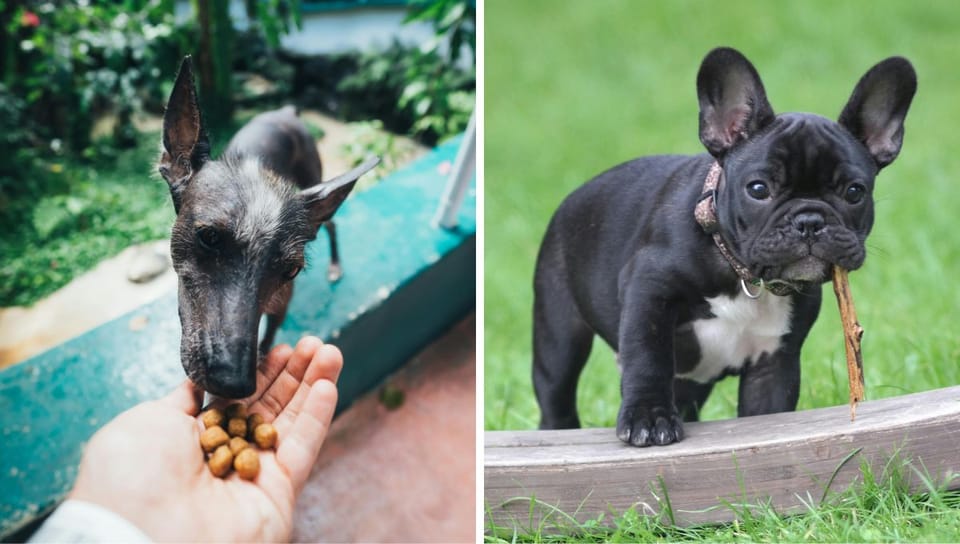Glyphosate in Dog Foods: What Every Pet Owner Needs to Know

Key Takeaways:
- Glyphosate is a common herbicide found in many dog foods.
- Understanding the potential risks and how to avoid them is crucial for your pet's health.
- There are safer alternatives and practices to ensure your dog's diet is free from harmful chemicals.
Dog eating in a park
What is Glyphosate?
Glyphosate is a widely used herbicide, primarily known for its role in agriculture. It’s the active ingredient in many weed killers, including the popular Roundup. Farmers use glyphosate to control weeds and enhance crop yields. However, its pervasive use has led to its presence in various food products, including dog foods.
The concern arises from the fact that glyphosate residues can remain on crops even after they are processed into food. This means that when you buy dog food, there’s a chance it contains traces of this herbicide. Understanding what glyphosate is and how it ends up in dog food is the first step in making informed choices for your pet’s diet.
How Does Glyphosate End Up in Dog Food?
Glyphosate can find its way into dog food through several pathways. One primary route is through the grains and other plant-based ingredients used in dog food formulations. Crops like corn, soy, and wheat are often treated with glyphosate during their growth cycle. When these crops are harvested and processed into dog food, the glyphosate residues can remain.
Another way glyphosate enters dog food is through the meat of animals that have consumed glyphosate-treated feed. Livestock such as cows and chickens may ingest glyphosate residues from their feed, which can then be transferred to the meat products used in dog food. This indirect exposure adds another layer of complexity to ensuring your dog’s food is free from harmful chemicals.
Potential Health Risks of Glyphosate in Dogs
The presence of glyphosate in dog food raises significant health concerns. Studies have suggested that glyphosate can disrupt the gut microbiome, leading to digestive issues and weakened immune systems in dogs. Additionally, long-term exposure to glyphosate has been linked to more severe health problems, including cancer and liver damage.
While the exact impact of glyphosate on dogs is still being studied, the potential risks are enough to warrant caution. Pet owners should be aware of these dangers and take steps to minimize their dogs' exposure to glyphosate. This includes being vigilant about the ingredients in their dog’s food and opting for products that are certified glyphosate-free.
Recognizing Glyphosate in Dog Food Labels
Identifying glyphosate in dog food can be challenging since it’s not typically listed as an ingredient. However, there are clues you can look for on the label. Ingredients such as corn, soy, and wheat are often associated with higher glyphosate residues. Choosing dog foods that avoid these ingredients or use organic versions can reduce the risk of glyphosate exposure.
Another strategy is to look for dog foods that are certified organic or non-GMO. These certifications often indicate that the ingredients were grown without the use of synthetic herbicides, including glyphosate. By paying close attention to labels and certifications, you can make more informed choices about the food you provide for your dog.
Alternatives to Glyphosate-Contaminated Dog Foods
Fortunately, there are alternatives to dog foods that may contain glyphosate. Many pet food brands now offer organic and non-GMO options that are less likely to have glyphosate residues. These products use ingredients that are grown without synthetic herbicides, providing a safer option for your pet.
Another alternative is to prepare homemade dog food using organic ingredients. This allows you to have complete control over what goes into your dog’s diet. By sourcing organic meats, vegetables, and grains, you can ensure that your dog’s food is free from harmful chemicals like glyphosate. While this approach requires more effort, it can be a worthwhile investment in your dog’s health.
Case Studies: The Impact of Glyphosate-Free Diets
Several pet owners have reported significant improvements in their dogs' health after switching to glyphosate-free diets. For example, one dog owner noticed that her dog’s chronic digestive issues resolved after transitioning to an organic dog food brand. Another pet owner observed increased energy levels and a shinier coat in her dog after eliminating glyphosate-contaminated foods.
These anecdotal reports highlight the potential benefits of avoiding glyphosate in your dog’s diet. While more scientific research is needed to fully understand the impact, these case studies provide encouraging evidence that a glyphosate-free diet can positively affect your dog’s health and well-being.
The Role of Regulatory Bodies
Regulatory bodies play a crucial role in monitoring and controlling the presence of glyphosate in food products, including dog foods. In the United States, the Environmental Protection Agency (EPA) sets limits on the amount of glyphosate residue allowed in food. However, these limits are often based on human consumption and may not fully account for the unique sensitivities of dogs.
Pet owners should be aware that regulatory standards may not always guarantee the safety of their dog’s food. Staying informed about the latest research and guidelines can help you make better choices. Additionally, advocating for stricter regulations and more comprehensive testing can contribute to safer food standards for pets.
How to Test for Glyphosate in Dog Food
If you’re concerned about glyphosate in your dog’s food, there are ways to test for its presence. Several laboratories offer testing services that can detect glyphosate residues in food products. By sending a sample of your dog’s food to one of these labs, you can get a clearer picture of whether glyphosate is present and at what levels.
While testing can provide valuable information, it’s also important to consider the cost and practicality. Regular testing may not be feasible for every pet owner, but it can be a useful tool for those who want to ensure their dog’s food is free from harmful chemicals. Combining testing with other strategies, such as choosing certified organic products, can offer a more comprehensive approach to safeguarding your dog’s health.
Practical Tips for Avoiding Glyphosate in Dog Foods
Avoiding glyphosate in dog foods requires a proactive approach. Start by researching and choosing dog food brands that prioritize organic and non-GMO ingredients. Look for certifications that indicate the food has been produced without synthetic herbicides. Additionally, consider rotating your dog’s diet to include a variety of foods, which can reduce the risk of prolonged exposure to any single contaminant.
Another practical tip is to engage with your veterinarian about your concerns. Veterinarians can provide guidance on the best dietary choices for your dog and may recommend specific brands or formulations that are less likely to contain glyphosate. By staying informed and seeking professional advice, you can take meaningful steps to protect your dog’s health.
Summary
Glyphosate in dog foods is a growing concern for pet owners. Understanding what glyphosate is, how it ends up in dog food, and the potential health risks it poses is crucial for making informed decisions about your pet’s diet. By recognizing the signs of glyphosate contamination, exploring safer alternatives, and staying informed about regulatory standards, you can take proactive steps to ensure your dog’s food is free from harmful chemicals.
FAQ
1. What is glyphosate, and why is it in dog food?
Glyphosate is a herbicide used to control weeds in agriculture. It can end up in dog food through crops treated with glyphosate or through meat from animals that consumed glyphosate-treated feed.
2. How can I tell if my dog’s food contains glyphosate?
Glyphosate is not typically listed on dog food labels. However, you can look for clues such as the presence of corn, soy, and wheat, which are often treated with glyphosate. Choosing organic or non-GMO certified products can also reduce the risk.
3. Are there safer alternatives to glyphosate-contaminated dog foods?
Yes, there are safer alternatives. Many brands offer organic and non-GMO dog foods that are less likely to contain glyphosate. Additionally, preparing homemade dog food using organic ingredients can ensure your dog’s diet is free from harmful chemicals.





